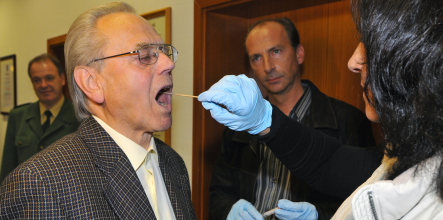To uncover the retiree with the murderous past, police took DNA samples from 5,000 elderly men around the small town of Weiskirchen this week.
Lydia Schuermann left her house in the village of Wiedenbrück in central Germany in April 1962 after an argument with her parents. The 13-year-old was given a lift by a lorry driver who let her out at the Dutch border. Her body was found by mushroom-hunters four months later in a shallow grave in woodland near the German town of Bielefeld.
In late February 1970, 29-year-old prostitute Heiderose Berchner was last seen with two men in a pub in Nuremberg. Her half-burned corpse was found wrapped in a blanket in woods near Ulm on March 1 the same year.
The cases were closed as unresolved, but in July 2006 police received an anonymous letter. “I have a confession to make. I am old and I am sick and am looking back on my life and there is one thing I cannot deal with. I killed someone,” it said. It contained enough details for police to conclude that this, at last, was a lead that might help them find Lydia’s killer.
And another one, received in Nuremberg more than 400 kilometres away, made them dust off the files related to Heiderose.
“I am turning to you about a case that goes back some time. A friend told me about it, although I didn’t believe him,” it said. “He confessed a murder to me in 2001 … I am not revealing my name or my friend’s. Maybe what he told me was all nonsense.”
The police didn’t think it was nonsense — that is except for the bit about the “friend”, whom the letter said was dead. They put two and two together, found a DNA match between the two letters and with an unspecified clue related to Berchner’s murder, concluded they were hunting for one and the same man.
The murderer had to be at least in his mid-sixties and probably considerably older, probably German, possibly ill but unlikely to be dangerous anymore, police said in appeals to the public.
Other letters followed, all of them anonymous. They wrote about the murderer wanting to “ease his conscience” and trying to explain his motives for killing, which he said he regretted.
He also said he was following media coverage of the case but that he did not like what he was reading, taking particular exception to being labelled “Germany’s oldest serial murderer,” a “monster” and “old and in need of care.”
Each of the letters was sent to a different place. In one sent to police in Bielefeld in January 2007, he said Lydia had been picked up on the Dutch border where she was hitchhiking. “In case you don’t know who the perpetrator is yet, I can help you in this
case,” the letter said.
Police made two appeals on television to help them find this mysterious murderer-cum-retiree, whom press reports said might also be responsible for at least four other killings committed in the 1960s.
But then came what may well turn out to be a key piece of the jigsaw –another anonymous letter on June 18, 2007. This time it was nothing to do with a murder but, bizarrely, was to threaten a popular Austrian DJ if a planned concert took place on June 26.
“We do not want DJ Oetzi here … If he gets up on stage he will be bumped off his last hour has come get rid of him he doesn’t belong here,” the letter, printed in upper case without punctuation, said.
It arrived at the town hall in Weiskirchen, a small town near the French and Luxembourg borders, but what caught the police’s attention was an enclosed extract from a free local paper available only in the immediate area. From this clue police concluded their man lived nearby.
The DNA tests are voluntary but anyone refusing would open themselves to
suspicion.
“Of course our man might refuse to be tested. But we also hope that he will take the test in order to get himself noticed,” police spokesman Williband Kross told AFP. “The best thing would be if he gives himself up.”
Police said Thursday that the latest anonymous letter they received said
that the writer did not live in Weiskirchen. But suspecting a bid to put them off the scent, investigators pressed ahead with the voluntary tests.




 Please whitelist us to continue reading.
Please whitelist us to continue reading.